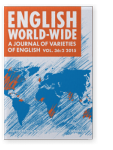An Optimality-Theoretic approach to dialect code-switching
Despite the numerous frameworks for analyzing patterns of code-switching (CS) in multilingual communities, previous analyses have lacked a thorough treatment of the universality of the functions of CS. A recent model (Bhatt and Bolonyai 2011) addresses this gap by presenting a framework that incorporates principles of Optimality Theory (OT) and offers a precise model in which the countless functions of CS are reduced to five meta-constraints, the interaction and satisfaction of which account for the different grammars of bilingual language use. This framework’s applicability to situations of dialectal CS must be tested in order to show the breadth and depth of the model. This paper presents a reanalysis of the data in Mishoe (1995), which utilized the Markedness Model (Myers-Scotton 1993), within Bhatt and Bolonyai’s (2011) OT framework, demonstrating that data previously analyzed using another model of CS receives a better account under Bhatt and Bolonyai’s OT approach.
References (34)
Adger, David, and Graeme Trousdale
2007 “
Variation in English Syntax: Theoretical Implications”.
English Language and Linguistics 111: 261–278.


Auer, Peter
ed. 1998 Code-Switching in Conversation: Language, Interaction and Identity. London: Routledge.

Bell, Allan
1984 “
Language Style as Audience Design”.
Language in Society 131: 145–204.


Bell, Allan
2001 “
Back in Style: Reworking Audience Design”. In
Penelope Eckert, and
John Rickford, eds.
Style and Sociolinguistic Variation. Cambridge: Cambridge University Press, 139–169.

Bhatt, Rakesh M
2000 “
Optimal Expressions in Indian English”.
English Language and Linguistics 41: 69–95.


Bhatt, Rakesh M., and Agnes Bolonyai
2011 “
Code-Switching and the Optimal Grammar of Bilingual Language Use”.
Bilingualism: Language and Cognition 141: 522–546.


Britt, Erica
2011 “
‘Can the Church Say Amen’: Strategic Uses of Black Preaching Style at the State of the Black Union”.
Language in Society 401: 211–233.


Bolonyai, Agnes
2005 “
‘Who Was the Best?’: Power, Knowledge and Rationality in Bilingual Girls’ Code Choices”.
Journal of Sociolinguistics 91: 3–27.


Brown, Penelope, and Stephen C. Levinson
1987 Politeness: Some Universals in Language Use. Cambridge: Cambridge University Press.


Childs, Becky, and Christine Mallinson
Eckert, Penelope, and Sally McConnell-Ginet
1999 “
New Generalizations and Explanations in Language and Gender Research”.
Language in Society 281: 185–201.


Gal, Susan
1987 “
Code-Switching and Consciousness in the European Periphery”.
American Ethnologist 141: 637–653.


Goffman, Erving
1967 Interaction Ritual. New York: Anchor Books.

Greene, Deric M., and Felicia R. Walker
2004 “
Recommendations to Public Speaking Instructors for the Negotiation of Code-Switching Practices Among Black English-Speaking African American Students”.
The Journal of Negro Education 731: 435–442.


Gumperz, John J
1982 Discourse Strategies. Cambridge: Cambridge University Press.


Hayes, Bruce
2000 “
Gradient Well-Formedness in Optimality Theory”. In
Joost Dekkers,
Frank van der Leeuw, and
Jeroen van de Weijer, eds.
Optimality Theory: Phonology, Syntax, and Acquisition. Oxford: Oxford University Press, 88–120.

Heller, Monica
1995 “
Code-Switching and the Politics of Language”. In
Lesley Milroy, and
Pieter Muysken, eds.
One Speaker, Two Languages: Cross-Disciplinary Perspectives on Code-Switching. Cambridge: Cambridge University Press, 158–174.


Henry, Alison
1995 Belfast English and Standard English: Dialect Variation and Parameter Setting. Oxford: Oxford University Press.

Holmes, Janet, and Miriam Meyerhoff
1999 “
The Community of Practice: Theories and Methodologies in Language and Gender Research”.
Language in Society 281: 173–183.


Kovács, Timea
2010 “
The Applicability of Optimality Theory for the Analysis of Bilingual Grammar in the Hungarian-American Bilingual Community in North Carolina: A Comprehensive Description of the North Carolina Hungarian Club’s Code-Switching Patterns”. Ph.D. dissertation, University of Sciences, Pécs, Hungary.
Labov, William
1966 The Social Stratification of English in New York City. Washington, DC: Center for Applied Linguistics.

Lee, Young Sun
2009 “
Korean–English Code-Switching and Optimality Theory”. Paper presented at the Annual Meeting of the American Association for Applied Linguistics, Denver, CO.
Li, Wei
1994 Three Generations, Two Languages, One Family: Language Choice and Language Shift in a Chinese Community in Britain. Clevedon: Multilingual Matters.

Mishoe, Margaret
1995 “
Dialect Codeswitching Among Lower Class Socioeconomic Speakers in the Southern United States: A Sociolinguistic Study”. Ph.D. dissertation, University of South Carolina, Columbia, SC.
Myers-Scotton, Carol
1993 Social Motivations for Codeswitching: Evidence from Africa. Oxford: Clarendon Press.

Myers-Scotton, Carol
ed. 1998 Codes and Consequences: Choosing Linguistic Varieties. New York: Oxford University Press.

Myers-Scotton, Carol, and Agnes Bolonyai
2001 “
Calculating Speakers: Codeswitching in a Rational Choice Model”.
Language in Society 301: 1–28.


Pederson, Lee, Susan Leas McDaniel, and Marvin H. Bassett
eds. 1986 The Linguistic Atlas of the Gulf States: A Concordance of the Basic Materials. Ann Arbor, MI: University Microfilms.

Prince, Alan, and Paul Smolensky
2004 Optimality Theory: Constraint Interaction in Generative Grammar. Malden, MA: Blackwell Publishing.


Smitherman, Geneva
2004 “
Language and African Americans: Moving on up a Lil Higher”.
Journal of English Linguistics 321: 186–196.


Soukup, Barbara
2011 “
Austrian Listeners’ Perceptions of Standard–Dialect Style-Shifting: An Empirical Approach”.
Journal of Sociolinguistics 151: 347–365.


Wheeler, Rebecca
2008 “
Becoming Adept at Code-Switching”.
Educational Leadership 651: 54–58.

Wolfram, Walt, and Ralph Fasold
1974 The Study of Social Dialects of American English. Englewood Cliffs, NJ: Prentice-Hall.

Woolard, Kathryn
1988 “
Codeswitching and Comedy in Catalonia”. In
Monica Heller, ed.
Codeswitching: Anthropological and Sociolinguistic Perspectives. Berlin and New York: Mouton de Gruyter, 53–76.


Cited by (2)
Cited by 2 other publications
Bhatt, Rakesh & Agnes Bolonyai
2022.
Multilingualism as an Object of Sociolinguistic Description.
Languages 7:4
► pp. 277 ff.

Karimzad, Farzad
2018.
Optimal choices: Azeri multilingualism in indigenous and diaspora contexts.
International Journal of Bilingualism 22:2
► pp. 141 ff.

This list is based on CrossRef data as of 2 july 2024. Please note that it may not be complete. Sources presented here have been supplied by the respective publishers.
Any errors therein should be reported to them.
